| 455th Flying Training Squadron | |
|---|---|
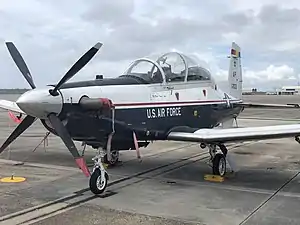 T-6A Texan II as flown by the squadron | |
| Active | 1942–1945; 1949–1951; 1955–1957; 1973–1993; 2009–present |
| Country | |
| Branch | |
| Role | Flying Training |
| Part of | Air Education and Training Command |
| Motto(s) | Sine Alis Volamus (Latin for 'Without Wings We Fly') (World War II) Supersonic Security (1957)[1] Sine Alis Adsurgimus (Latin for 'Without Wings We Rise') (2023-) |
| Engagements | European Theater of Operations[2] |
| Decorations | Distinguished Unit Citation Air Force Outstanding Unit Award[2] |
| Insignia | |
| 455th Flying Training Squadron emblem[lower-alpha 1][2] | .png.webp) |
| 455th Flying Training Squadron emblem[lower-alpha 2][3] | 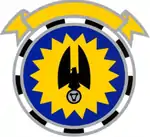 |
| 455th Fighter-Bomber Squadron emblem[lower-alpha 3][1] | 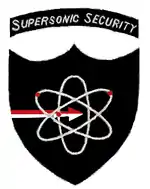 |
| 455th Bombardment Squadron emblem (World War II[4] | 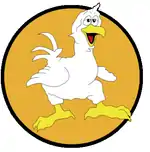 |
The 455th Flying Training Squadron is a United States Air Force unit of Air Education and Training Command. It was most recently activated at NAS Pensacola as part of the 479th Flying Training Group, where it trains Combat Systems Officers with the Raytheon T-6 Texan II.
The squadron was first activated during World War II as the 455th Bombardment Squadron. After training in the United States, it deployed to the European Theater of Operations, earning a Distinguished Unit Citation before returning to the United States for inactivation. It was activated again in the reserves in 1949. It was mobilized in 1951 for the Korean War and inactivated, as its personnel were used as fillers for other units.
The squadron was redesignated the 455th Fighter-Bomber Squadron and activated in Tactical Air Command in 1955, but inactivated two years later. In 1973 it was activated at Mather Air Force Base, where it trained navigators until it was inactivated on 1 October 1993. It was reactivated in October 2009.
History
World War II
Organization and training in the United States
The squadron was first activated as the 455th Bombardment Squadron at Columbia Army Air Base, South Carolina on 4 August 1942 as one of the four original squadrons of the 323d Bombardment Group. After Phase I training at MacDill Field, Florida with Martin B-26 Marauders, the squadron trained for combat at Myrtle Beach Bombing Range, South Carolina until late April 1943, when the ground echelon departed Myrtle Beach for England, sailing on the RMS Queen Elizabeth on 5 May. The air echelon of the squadron had moved to Baer Field, Indiana in February. At Baer, it received new B-26Cs, then proceeded to the United Kingdom via the south Atlantic ferry route by June.[2][5][6]
Combat in Europe
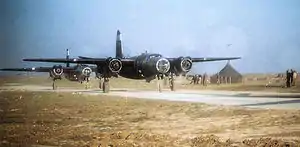
The squadron began operations with Eighth Air Force in July 1943 as part of the first raid on the European continent by B-26s.[6] When Ninth Air Force moved to the United Kingdom in the fall of 1943, the squadron became part of it. It attacked airports, industrial factories, marshalling yards and military targets in France and the Low Countries. During Big Week the squadron attacked Leeuwarden and Venlo Airfields. The squadron also attacked V-weapons launch sites in France.[5]
In preparation for Operation Overlord, the Invasion of Normandy, the 455th attacked coastal defenses and other targets in northwestern France. on D-Day it attacked lines of communication and fortifications on the coast. It was part of the aerial barrage during the opening stage of Operation Cobra, the breakout at Saint Lo.[5]
In late August 1944, the squadron left England for Lessay Airfield, an advanced landing ground in France. From the continent, it began flying night missions, with its first night mission against batteries near Saint-Malo. It also carried out night missions against ammunition dumps and fuel storage areas. In September, it attacked fortifications near Brest, France, and as allied forces advanced across France, toward the Siegfried Line shifted its operations primarily to targets in eastern France. The squadron was awarded a Distinguished Unit Citation for striking transportation hubs used by the Wehrmacht to bring reinforcements to the Ardennes during the Battle of the Bulge.[5]
The 455th flew interdiction missions in the Ruhr as the Allies drove across Germany and attacked enemy communications. It flew its last combat in April 1945, then moved to Kempten, Germany, where it participated in the program to disarm Germany. It returned to the United States in November and was inactivated at Camp Myles Standish, Massachusetts, the port of embarkation, a day later.[2][5]
Air Force reserve
The squadron was reactivated under Continental Air Command (ConAC) as a reserve unit at Tinker Air Force Base in June 1949, when ConAC reorganized its reserve units under the wing base organization system.[2] At Tinker, it trained under the supervision of ConAC's 2592d Air Force Reserve Training Center.[7] The squadron flew a mix of trainers and Douglas A-26 Invaders.[8] The unit was manned at only 25% of its normal strength.[9] All reserve combat units were mobilized for the Korean war.[10] The squadron was mobilized on 10 March 1951. Its personnel and aircraft were used as fillers for other organizations ond the squadron was inactivated a week later.[2][11]
Fighter operations
Reactivated as an air defense interceptor squadron in Alaska in 1955; reassigned to Tactical Air Command in 1955 and moved to Indiana. Inactivated in 1957 due to budget reductions
Flying training
Reactivated by Air Training Command as a navigator training squadron in 1973; inactivated with the closure of Mather Air Force Base and the inactivation of its host unit in 1993. Reactivated by the Air Education and Training Command as a USAF Combat Systems Officer (formerly known as USAF Navigator) training squadron at NAS Pensacola in 2010.
Lineage
- Constituted as the 455th Bombardment Squadron, Medium on 19 June 1942
- Activated on 4 August 1942
- Inactivated on 12 December 1945
- Redesignated 455th Bombardment Squadron, Light on 10 May 1949
- Activated in the reserve on 27 June 1949
- Ordered to active service 10 March 1951
- Inactivated on 17 March 1951
- Redesignated 455th Fighter-Bomber Squadron on 9 May 1955
- Activated on 8 August 1955
- Inactivated on 1 September 1957
- Redesignated 455th Flying Training Squadron on 28 July 1972
- Activated on 31 May 1973
- Inactivated on 1 October 1993
- Activated on 2 October 2009[1]
Assignments
- 323d Bombardment Group, 4 August 1942 – 26 November 1945
- 323d Bombardment Group, 27 June 1949 – 17 March 1951
- 11th Air Division, 8 August 1955
- 323d Fighter-Bomber Group, 22 November 1955 – 1 September 1957
- 323d Flying Training Wing, 1 April 1973 – 1 October 1993
- 479th Flying Training Group, 2 October 2009 – present[1]
Stations
|
|
Aircraft
- Martin B-26 Marauder, 1942–1945
- Douglas B-26 Invader, 1949–1951
- North American T-6 Texan, by 1949–1951[8]
- Beechcraft T-7 Navigator, 1950–1951[8]
- Beechcraft T-11 Kansan, by 1949–1951[8]
- North American F-86 Sabre, 1955–1956
- North American F-100 Super Sabre, 1957-1957
- Convair T-29 Flying Classroom 1973–1975
- Cessna T-37 Tweet 1973–1993
- Boeing T-43 Bobcat 1973–2010
- Raytheon T-6 Texan II 2010–present[15]
References
Notes
- Explanatory notes
- ↑ Approved 10 May 2023.
- ↑ Approved 30 May 1973.
- ↑ Approved 7 June 1957. Description: On a shield black, an atomic symbol of three white elliptical electronic rings and two red nuclei; piercing through the symbol a supersonic dart-shaped silhouetted white aircraft with red and white power, trailing off to the dexter side of the shield.
- Citations
- 1 2 3 4 Maurer, Combat Squadrons, p. 561
- 1 2 3 4 5 6 7 Robertson, Patsy (3 February 2010). "Factsheet 455 Flying Training Squadron (AETC)". Air Force Historical Research Agency. Retrieved 5 December 2018.
- ↑ Robertson, Patsy (3 February 2010). "Factsheet 455 Flying Training Squadron (AETC)". Air Force Historical Research Agency. Archived from the original on 20 October 2020. Retrieved 11 October 2023.
- ↑ Watkins, p. 100
- 1 2 3 4 5 Maurer, Combat Units, pp. 203–204
- 1 2 Freeman, p. 249
- ↑ See Mueller, p. 549 (training center station).
- 1 2 3 4 See Ravenstein, pp. 174–176 (323d Wing aircraft).
- ↑ Cantwell, p. 74
- ↑ Cantwell, p. 87
- ↑ Cantwell, pp. 97, 137
- 1 2 3 Station number in Anderson.
- 1 2 3 4 5 6 7 Station number in Johnson.
- ↑ Station information in Robertson, except as noted.
- ↑ Aircraft in Robertson, except as noted.
Bibliography
![]() This article incorporates public domain material from the Air Force Historical Research Agency
This article incorporates public domain material from the Air Force Historical Research Agency
- Anderson, Capt. Barry (1985). Army Air Forces Stations: A Guide to the Stations Where U.S. Army Air Forces Personnel Served in the United Kingdom During World War II (PDF). Maxwell AFB, AL: Research Division, USAF Historical Research Center. Archived from the original (PDF) on 23 January 2016. Retrieved 28 June 2017.
- Cantwell, Gerald T. (1997). Citizen Airmen: a History of the Air Force Reserve, 1946–1994. Washington, D.C.: Air Force History and Museums Program. ISBN 0-16049-269-6. Retrieved 17 December 2016.
- Freeman, Roger A. (1970). The Mighty Eighth: Units, Men and Machines (A History of the US 8th Army Air Force). London, England, UK: Macdonald and Company. ISBN 978-0-87938-638-2.
- Johnson, 1st Lt. David C. (1988). U.S. Army Air Forces Continental Airfields (ETO) D-Day to V-E Day (PDF). Maxwell AFB, AL: Research Division, USAF Historical Research Center. Archived from the original (PDF) on 29 September 2015. Retrieved 26 June 2017.
{{cite book}}: CS1 maint: numeric names: authors list (link) - Maurer, Maurer, ed. (1983) [1961]. Air Force Combat Units of World War II (PDF) (reprint ed.). Washington, DC: Office of Air Force History. ISBN 0-912799-02-1. LCCN 61060979.
- Maurer, Maurer, ed. (1982) [1969]. Combat Squadrons of the Air Force, World War II (PDF) (reprint ed.). Washington, DC: Office of Air Force History. ISBN 0-405-12194-6. LCCN 70605402. OCLC 72556.
- Ravenstein, Charles A. (1984). Air Force Combat Wings, Lineage & Honors Histories 1947–1977. Washington, DC: Office of Air Force History. ISBN 0-912799-12-9. Retrieved 17 December 2016.
- Watkins, Robert (2008). Battle Colors. Vol. III Insignia and Markings of the Ninth Air Force in World War II. Atglen, PA: Shiffer Publishing Ltd. ISBN 978-0-7643-2938-8.